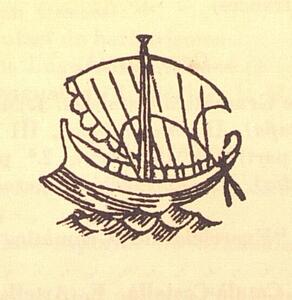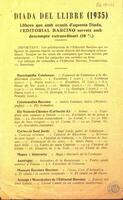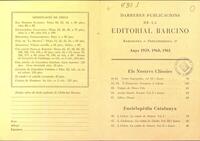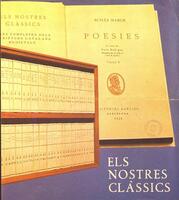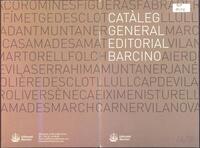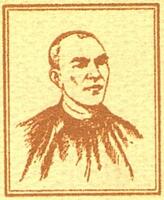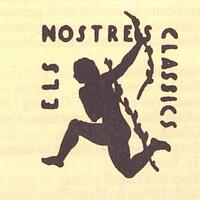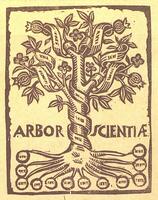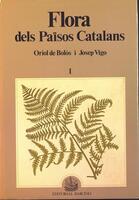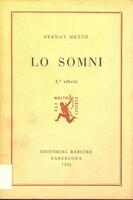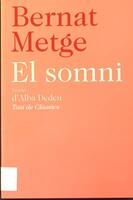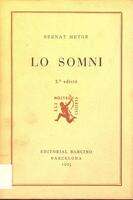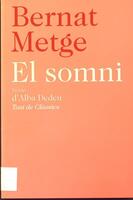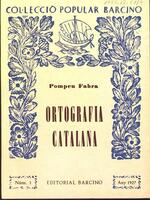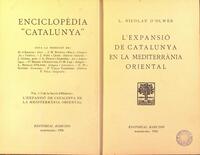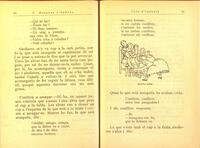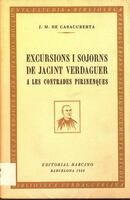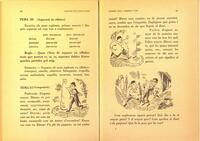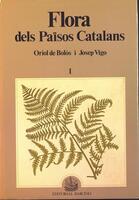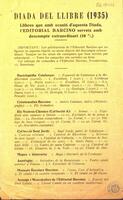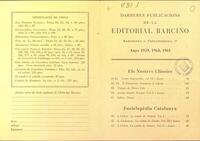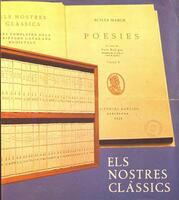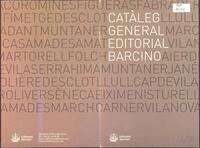Barcino
(Updated 08/10/2024)
Founded in Barcelona in 1924 by the publisher and linguist Josep Maria de Casacuberta, Barcino began as a tool to disseminate and normalise Catalan culture and as Catalan society’s response to the anti-Catalan attitude of the Primo de Rivera dictatorship. The most salient feature of this publishing house was that from the very start it rigorously revised the texts of all the books it published. From its founding as well, Casacuberta enlisted the support of first-rate intellectuals like Pere Bohigas, Pompeu Fabra, Lluís Nicolau d’Olwer and Jordi Rubió.
The publication of titles with such emblematic collections as Els Nostres Clàssics and Col·lecció Popular Barcino, prolifically in the early years, radically dropped off with the outbreak of the Civil War and did not resume any semblance of normalcy until 1947, when some of the collections were gradually revived and new ones developed.
+ informationSearch collections
In February 2019 Barcino has signed a donation agreement with the Biblioteca de Catalunya for a part of documentary archive.
Josep Maria de Casacuberta collection at the Biblioteca de Catalunya
Josep Maria de Casacuberta and Joan Torrent collection on Verdaguer at the Biblioteca de Catalunya
Personal papers in the Arxiu Nacional de Catalunya (National Archive of Catalonia)
Catalogue of publishers and booksellers from the Bergnes de las Casas collection (Biblioteca de Catalunya)
Catalogues of publishers of Catalonia (Biblioteca de Catalunya)
More information and documentation on the works produced
Website of the publishing house
Clàssics i més: l’Editorial Barcino i Josep Maria de Casacuberta. Barcelona: Barcino, 2005.
Duarte i Montserrat, Carles. “L’editorial Barcino: un projecte editorial, una idea de país”. Estudis romànics, 31 (2009), p. 343-349.
Llanas, Manuel. L'edició a Catalunya. Segle XX (fins a 1939). Barcelona: Gremi d'Editors de Catalunya, 2005.
Llanas, Manuel. L'edició a Catalunya. Segle XX (1939-1975). Barcelona: Gremi d'Editors de Catalunya, 2005.
Barcino
Description
Founded in Barcelona in 1924 by the publisher and linguist Josep Maria de Casacuberta, Barcino began as a tool to disseminate and normalise Catalan culture and as Catalan society’s response to the anti-Catalan attitude of the Primo de Rivera dictatorship. The most salient feature of this publishing house was that from the very start it rigorously revised the texts of all the books it published. From its founding as well, Casacuberta enlisted the support of first-rate intellectuals like Pere Bohigas, Pompeu Fabra, Lluís Nicolau d’Olwer and Jordi Rubió.
The publication of titles with such emblematic collections as Els Nostres Clàssics and Col·lecció Popular Barcino, prolifically in the early years, radically dropped off with the outbreak of the Civil War and did not resume any semblance of normalcy until 1947, when some of the collections were gradually revived and new ones developed.
During the 1950s and early 1960s, Barcino’s activity increased with new titles and collections, albeit with difficulties for reasons such as the economic outlays entailed in running the publishing house.
In 1972, the Fundació Carulla-Font (currently the Fundació Lluís Carulla) took over the financial management of the publishing house, with Casacuberta still at the helm until his death in 1985. Amadeu-J. Soberanas, a linguist and manuscript conservator at the Biblioteca de Catalunya, succeeded him as the literary director, and the publishing house consolidated its role as the “replacement publisher”, that is, the driving force behind initiatives that Catalan culture needed but that could not be undertaken by publishers with strictly profit-driven missions. Some of the emblematic collections continued and new ones were created, while other works were published outside collections, such as the four-volume set of Flora dels Països Catalans, a seminal work in its field.
Today, the publishing house continues its efforts to disseminate Catalan culture and literature with editions that are still published with the same scholarly rigour as ever and the endorsement of experts from around the Catalan-speaking territories. To adapt to the new times, it recently created the Biblioteca Digital collection, which seeks to disseminate mediaeval texts in electronic format.
Barcino also has agreements to co-publish old Catalan texts in English with Tamesis Books, in German with LIT Verlag, and in Spanish with Pre-textos. The poet and linguist Carles Duarte is currently its managing director.
Barcino
Authors
One of the main founding missions of Barcino was to disseminate the great authors of mediaeval Catalan culture. Studies by scholars and experts of the day, as well as current ones, complete the catalogue of this publishing house which has always issued both popular and highbrow culture publications. Likewise, the figure of Jacint Verdaguer stands out for the study from which the Biblioteca Verdagueriana collection was created.
Amades, Joan, 1890-1959
Eiximenis, Francesc, 1327?-1409
Fabra, Pompeu, 1868-1948
Galí, Alexandre, 1886-1969
Llull, Ramon, 1232-1316
Marc, Ausiàs, ca. 1397-1459
Metge, Bernat, ca. 1340-1413
Nicolau d'Olwer, Lluís, 1888-1961
Pi i Sunyer, Carles, 1888-1971
Riba, Carles, 1893-1959
Rovira i Virgili, Antoni, 1882-1949
Verdaguer, Jacint, 1845-1902
Verdaguer, Pere, 1929-2017
Barcino
Collections
Of the numerous collections issued by Barcino, a few with just a handful of publications, the notable ones include Els Nostres Clàssics and Col·lecció Popular Barcino, the publishing house’s first two collections which became emblematic and are still around today. Other noteworthy collections are the Biblioteca Verdagueriana, which aims to disseminate the works of Jacint Verdaguer, and the Enciclopèdia Catalunya collection, with titles on geography and customs all around the Catalan-speaking territories.
Barcino
Outstanding works
The Barcino catalogue features works by authors from mediaeval Catalan literature in more popular or more erudite editions, but always with a painstaking, rigorous revision of the texts. Likewise, other noteworthy publications include the works by Jacint Verdaguer and studies on his figure and oeuvre.
-
The first title published by Barcino, and also the first from the emblematic Els Nostres Clàssics collection, was Lo somni by Bernat Metge, published 1924. More recently, in 2012, the work was reissued and adapted to modern Catalan under the title of El somni, within the Tast de Clàssics collection.
Metge, Bernat. Lo somni. 2a ed. Barcelona: Barcino, 1925 (with text, notes and glossary by Josep Maria de Casacuberta), i Metge, Bernat. El somni. Barcelona: Barcino, 2012 (the version by Alba Dedeu).
-
Ortografia catalana by Pompeu Fabra began the Col·lecció Popular Barcino collection in 1925 which along with Els Nostres Clàssics published numerous titles from the very beginning.
Fabra, Pompeu. Ortografia catalana. 3a ed. Barcelona: Barcino, 1927.
-
First title from the Enciclopèdia Catalunya collection, launched in 1926, as part of the series devoted to history.
Nicolau d’Olwer, Lluís. L’expansió de Catalunya en la Mediterrània oriental. Barcelona: Barcino, 1926.
-
Illustration by Apa, the name with which the art critic and illustrator Feliu Elias signed his work, extracted from Joc d’infants, part of the Col·lecció Popular Barcino collection.
Maspons y Labrós, Francisco. Joc d’infants. Barcelona: Barcino, 1928.
-
Josep Maria de Casacuberta, major connoisseur of the figure and work of Jacint Verdaguer, in 1953 he launched the Biblioteca Verdagueriana collection, which he himself started with a study on the genesis of the poem Canigó. Prominent scholars of the poet have participated in the collection, including Joan Torrent, Narcís Garolera and Josep Junyent.
Casacuberta, Josep Maria de. Excursions i sojorns de Jacint Verdaguer a les contrades pirinenques. Barcelona: Barcino, 1953.
-
Illustrations by Josep Obiols, who also designed the logo of the emblematic Els Nostres Clàssics collection, extracted from Lliçons de llenguatge, part of the Manuals Lingüístics Barcino collection.
Galí, Alexandre. Lliçons de llenguatge: primer grau, primera part. Barcelona: Barcino; Andorra la Vella: Andorra, 1967.
-
Outside of its collections, Barcino published the four-volume Flora dels Països Catalans (1984-2001), which has become a crucial reference work in its field.
Bolós, Oriol de; Vigo, Josep. Flora dels Països Catalans. Barcelona: Barcino, 1984-<DL 2001>.
- Catalogues from the publishing house in different time periods.
